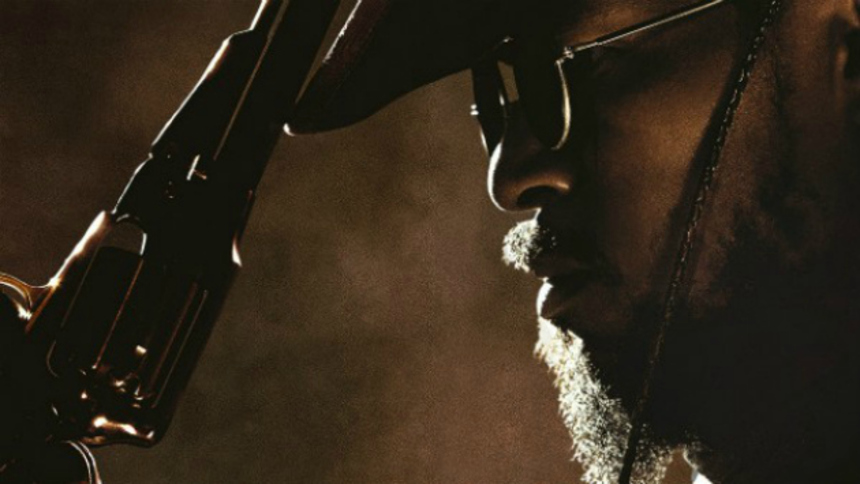Review: DJANGO UNCHAINED Is a Little Unfocused, But Bloody Good Fun

Quentin Tarantino's eighth feature film, Django Unchained, is his longest, his most narratively straightforward, and his N-word-iest. The godfather of modern gonzo filmmaking addresses American slavery and race relations the same way he has addressed other sensitive issues: by making a boisterously entertaining movie that couldn't be less interested in sensitivity. He's in it for the fun. If his amusing story about a resourceful ex-slave seeking vengeance against his tormenters happens to convey a message about the absurd moral wrongness of racism and slavery, well, that's cool. But the main thing is to have fun.
And Django Unchained is fun -- explosive, outrageous, and bloody, with the kind of shrewd, eyebrow-raising bombast we've come to expect from Tarantino. It's brimming with imaginative grace notes -- a horse that curtsies when it's introduced; a francophile who doesn't know any French -- and freewheeling performances, not to mention a killer soundtrack that, like the movie itself, blends retro with modern. But it's less focused than usual, more meandering. In fact, it borders on the self-indulgent, first in its unjustified lengthiness, second in Tarantino's own embarrassing cameo. Our enthusiastic auteur has never been what you'd call "restrained" in the past, but at least he's generally been disciplined.
Beginning in 1858 somewhere in Texas, the film introduces us to Django (played by Jamie Foxx) while he's still un-unchained, trudging with a group of fellow slaves through the woods after being purchased at auction. The company encounters one Dr. King Schultz (Christoph Waltz), an unerringly polite and cheerful German-born dentist and bounty hunter who believes Django can help him find a particularly elusive quarry. The two end up pursuing common enemies and striving to rescue Django's wife, Broomhilda (Kerry Washington), from her cruel new master, plantation owner Calvin Candie (an unusually animated Leonardo Di Caprio).
Except for a few judiciously employed flashbacks, the film is mostly linear, starting at the beginning of the story and ending at the end. In that way, it's refreshingly uncomplicated. Yet in another way, it's curiously convoluted: rather than go to Candie's place in Mississippi and buy (or steal) Broomhilda, Schultz convinces Django that a more elaborate ruse is required. I get where he's coming from, but his reasoning is shaky, and based on a lot of assumptions -- first and foremost, that Candie will need to be tricked into selling Django's beloved. This drives the story, so we wind up spending much of the film devoted to a course of action that doesn't entirely make sense.
Then again, it's hard to complain about the big picture when the details are so pleasingly vivid. There's a marvelous episode with a plantation owner who is played by Don Johnson and looks like Colonel Sanders, an episode that includes a lynch-mob scene that plays like a "Mr. Show" sketch. (That's a compliment.) There's Samuel L. Jackson playing a blustering, pop-eyed "house n*****" who cranks up the "Yes, suh! No, suh!" obsequiousness in public, gets real when he and the boss are behind closed doors. There are several interludes of grotesque violence that serve as a reminder of just how inhumanly brutal the whole business was, including a dip into the world of "Mandingo fighting," which is like cockfighting but with slaves.
To enjoy a Tarantino film is to enjoy feeling a little dirty now and then. His condemnation of slavery and racism is unequivocal here -- probably so much so that certain insecure types will find the movie guilty of being anti-white -- but he clearly enjoys rolling around in the filth of it. To see two men compelled to fight until one of them is too broken to continue is disgusting ... yet we have to admit, the fight itself is kind of cool. The same goes for Tarantino's fondness for realistic (perhaps even exaggerated) violence, emphasizing how bloody and painful bullet wounds are (and there are a lot of bullet wounds in this movie). On the one hand, it's more accurate than traditional Westerns are. On the other hand, you kind of just like watching people bleed, don't you, QT?
As do we all. If the slightly rambling Django Unchained is "lesser Tarantino" -- you know, only a B instead of an A -- it's still a heady, delirious good time. Every single actor appears to be having the time of his or her life; to single out Foxx, Waltz, Di Caprio, or Jackson for being so damn energized would be to overlook Don Johnson, Kerry Washington, Walton Goggins, James Remar, David Steen, and a dozen others. I'll take a misshapen but audacious effort like this over a timid one any day.
Django Unchained
Director(s)
- Quentin Tarantino
Writer(s)
- Quentin Tarantino
Cast
- Jamie Foxx
- Christoph Waltz
- Leonardo DiCaprio
- Kerry Washington







